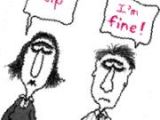Similar stressful circumstances have different long-term effects on people. Some of them are twice more likely than others to become depressed and some have a natural resistance against becoming depressed.
Kay Wilhelm of St Vincent's Hospital in Sydney and her associates from Brain Sciences at the University of New South Wales (UNSW) have analyzed DNA samples of a group of 127 people who have been monitored for over 25 years for any signs of depression and asked about major life events.
"We have been following a group of school teachers who graduated in 1978," said Wilhelm. "We've been catching up with them every five years since, to see if there has been any onset of depression and if there have been any major life events."
The geneticist on the paper, Professor Peter Schofield, who is Director of the Prince of Wales Medical Research Institute, said that they had found that some people are genetically predisposed to depression. "There is an 80 percent chance that those with the genetic predisposition will become depressed, if there are three or more negative life events in a year. This contrasts with some people who have genetic resilience against depression. Even in similar situations, there's only a 30 percent chance of them becoming depressed."
According to the study, more than a fifth of the population has such a genetic predisposition to depression. There are three different genetic types in the population. - 21 percent of people have the genotype that predisposes them to depression - 26 percent of people have the genotype with resilience to depression - 53 percent of people have a mix of the two genotypes
Maybe even more interestingly, the research also showed that depression isn't caused by a certain event - it is set going by a series of events happening during a sufficiently short time period.
"It's not just one negative life event, such as a health crisis," said Professor Philip Mitchell, Head of the UNSW School of Psychiatry. "The critical issue here is when you're exposed to a series of life events during a period of a year. There is a threshold."
"Our research is significant because there are social, psychological and genetic aspects to it," said Professor Schofield. "While there is plenty of evidence surrounding the significance of family history of depression, until now there has been very little idea about the specific genes involved."
"We already had a chart for each individual's life events and whether or not they had had a depressive episode," said Professor Wilhelm, who has tracked the teachers. "Now the genetic tests back that up. We are the first study to be able to look at the genetics and the five years leading up to the first depressive episode."
What is really interesting about this is that it seems to imply that depression is not caused by the negative events themselves, but by how individuals interpret the events. And it shows that a minority of us have a genetic predisposition to see the glass half empty (and thus are predisposed to interpret life as awful and get depressed), while another minority has the predisposition to see the glass half full. It seems amazing that pessimism and optimism are in people's genes.
"The research has some very significant implications," said Professor Wilhelm. "Perhaps you could reduce the likelihood of depression amongst those with the vulnerable genotype, by training them up in terms of improving their coping styles and stress responses. Eventually you might be able to better identify those who are likely to be at risk, suggest psychological treatment at times and even work out the best kind of antidepressant to use, if the need arises."

 14 DAY TRIAL //
14 DAY TRIAL // 
